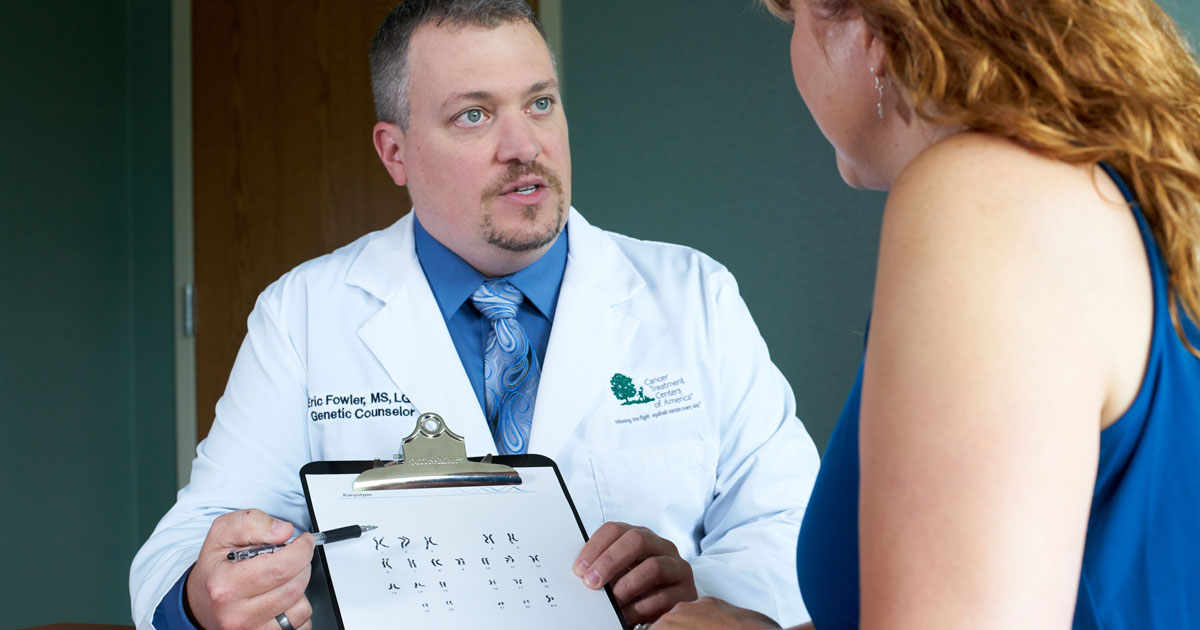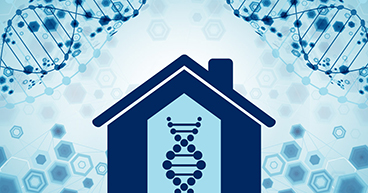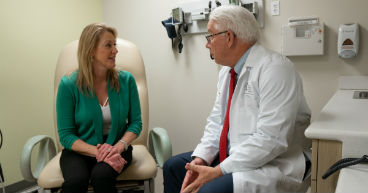
Update: In an article she wrote for ESPN.com, tennis great Chris Evert says doctors have told her she has no evidence of disease after being treated for stage 1C ovarian cancer. “I held my breath while I waited for my pathology results,” she wrote in the Jan. 17, 2023, article. “Luckily, the report came back clean and clear.” Evert’s sister, Jeanne, died of ovarian cancer in 2020. Chris Evert was diagnosed after a genetic test showed she shared the same BRCA1 gene variant as her sister. “My sister's journey saved my life,” she wrote, “and I hope by sharing mine, I just might save somebody else's.”
Want to share this with all of you. It’s been quite the year, and I am feeling very grateful! 🙏❤️https://t.co/iIZVLMJGX6
— Chris Evert (@ChrissieEvert) January 17, 2023
Tennis pros Chris and Jeanne Evert were as close as sisters can be. Growing up as part of a famous tennis family in Fort Lauderdale, Florida, the sisters traveled the world competing in the sport’s most prestigious events. Chris ascended to the top of the tennis world in the 1980s, winning 157 titles and 18 grand slam events. Jeanne never matched her older sister’s achievements but was the No. 1-ranked junior at one point and retired playing to become a respected coach.
Jeanne Evert passed away from ovarian cancer in 2020 at the age of 62. And even with all the sisters achieved and shared together in the decades before, it was perhaps Jeanne’s death that permanently bound the two sisters together in a way Chris Evert could never imagine.
“My sister’s death saved my life,” Chris Evert said in a recent interview in which she opened up about her own battle with cancer and how her sister’s genetic test led to her diagnosis. The Everts’ case also underscores the potential importance of genetic counseling and testing, especially when a relative is diagnosed with a cancer, such as breast or ovarian, that may be linked to inherited mutations.
“There definitely are a lot of people in the United States who have an inherited risk for cancer, such as a BRCA gene mutation, and don’t know it,” says Eric Fowler, Licensed Certified Genetic Counselor at Cancer Treatment Centers of America® (CTCA), Chicago. “They may not have any idea until they are diagnosed with cancer or cancer is diagnosed in a family member.”
In this article, we’ll explore:
- What is ovarian cancer?
- Jeanne Evert’s cancer diagnosis
- Gene variants of unknown significance
- Chris Evert’s cancer diagnosis
- Ovarian cancer treatment options
- BRCA mutations and cancer risk
- Genetic testing at CTCA
If you’ve been diagnosed with ovarian cancer or another gynecologic cancer and are interested in getting a second opinion on your diagnosis or treatment plan, call us or chat online with a member of our team.
What is ovarian cancer?
Ovarian cancer is a disease of the ovaries, which produce eggs during a woman’s reproductive years as well as the female hormones estrogen and progesterone. Ovarian cancer is also an umbrella phrase for cancers of the ovaries, fallopian tubes and peritoneum.
Ovarian cancer is not very common, especially relative to other cancers: It’s the 18th most common cancer diagnosed in the United States, accounting for fewer than one-10th of new female breast cancer cases and one-third of uterine cancer diagnoses.
The exact cause of a specific case of ovarian cancer may never be known, but several factors increase the risk of the disease, especially family history. Women who have an inherited breast cancer gene mutation (BRCA1 or BRCA2) or who have an inherited genetic disorder, such as Lynch syndrome, are at higher risk.
In fact, it was the discovery of a BRCA mutation that led to Chris Evert’s diagnosis.
Jeanne Evert’s diagnosis
In the fall of 2017, Chris and Jeanne Evert were racing through an airport to catch a plane to a tennis event, as they had many times before. This time, Jeanne could not keep up and struggled to catch her breath. She promised to see a doctor when they returned home.
She was later diagnosed with advanced-stage ovarian cancer, a disease that took her life after nearly 30 months of surgery, chemotherapy and other treatments.
"Jeanne was selfless, caring and kind," Chris Evert said after her sister’s passing. "As a sister, I admired her stellar character and her unwavering devotion to her loved ones.”
Prior to her death, Jeanne Evert underwent genetic testing to determine whether her cancer may have been caused by a mutation to a gene, such as BRCA1 or BRCA2. When the test revealed she did not have a gene mutation linked to cancer, Chris Evert decided not to get tested.
Variants of uncertain significance
But Jeanne Evert’s genetic test did reveal another important finding: She had a BRCA variant of uncertain significance (VUS).
“This is a difference or variant in a gene compared to the typical human genetic code,” Fowler says. “but there's not enough information to know whether it's actually meaningful and causes increased cancer risks or whether it is a benign change in the gene.”
In most cases, Fowler says, variants of uncertain significance, if reclassified, are proven to be benign.
“Sometimes, a VUS is later reclassified when new data becomes available and the meaning of the genetic variant is better understood,” Fowler says. “Most of the time, the reclassification of a VUS is a downgrade to a benign result. “It is not recommended that a VUS be used to guide cancer screening or risk reduction, or that relatives be tested for the variant.”
In the Everts’ case, the VUS was later reclassified as pathogenic, or capable of causing disease.
Chris Evert’s diagnosis
Four years after Jeanne Evert’s death, Chris Evert received a call about the change in her sister’s genetic report. She took immediate action. A genetic test revealed Chris Evert had the same BRCA variant as her sister.
Next was a hysterectomy. She also considered whether to have risk-reducing mastectomies to reduce her chances of developing breast cancer.
But during the hysterectomy and subsequent pathology tests, doctor found a malignant tumor on Chris Evert’s left fallopian tube. Her diagnosis: stage 1C ovarian cancer.
Ovarian cancer treatment
As with many cancers, when ovarian cancer is caught in stage 1, there’s reasonable hope and expectation for a positive outcome. The five-year survival rate for patients diagnosed with stage 1 ovarian cancer is 93 percent.
Chris Evert underwent two surgeries and six rounds of chemotherapy to treat her cancer, all while reliving her sister’s experiences.
"When I go into chemo, she is my inspiration," Chris Evert told ESPN. "I'll be thinking of her. And she'll get me through it."
In May, she rang the bell to signal the end of her treatment. And she was able to return to her duties covering the Wimbledon tournament in London.
“I’m a little out of it (meds),” she posted on social media, “but nonetheless, thankful and relieved I finished my 6 chemo treatments.”
I’m a little out of it ( meds) but nonetheless, thankful and relieved I finished my 6 chemo treatments .🙏🙏🙏 pic.twitter.com/awKOpFdbNk
— Chris Evert (@ChrissieEvert) May 9, 2022
Written reports about Jeanne’s diagnosis say only that she had advanced-stage disease that had spread. The five-year survival rate for ovarian cancer patients with metastatic disease is 30 percent. More than half of ovarian cancer cases are diagnosed after the disease has spread.
According to her sister, Jeanne Evert was treated with chemotherapy and surgery and possibly clinical trials.
Other treatments for ovarian cancer include:
— Chris Evert (@ChrissieEvert) March 28, 2022
BRCA mutations and cancer risk
The BRCA1 and BRCA2 gene alterations were discovered in 1994 and 1995, respectively. But it was Angelina Jolie who launched the gene mutations into the headlines.
Jolie’s mother, Marcheline Bertrand, died in 2007 after a nearly eight-year battle with ovarian cancer. Six years later, Jolie revealed that she had tested positive for a BRCA1 mutation and had a double mastectomy to reduce her risk of breast cancer. She later had her ovaries and fallopian tubes removed.
Jolie’s story raised awareness of the risks of having a BRCA mutation, triggering what became known as the “Angelina Jolie Effect.”
BRCA genes are tumor suppressors, among many genes in the body designed to discourage the growth and spread of cancer cells. When they mutate, the mechanisms designed to suppress tumors may break and allow a cancer to grow.
According to the National Cancer Institute:
- Women with a BRCA1 gene mutation have up to 72 percent chance of developing breast cancer and up to 44 percent chance of developing ovarian cancer by the time they reach their 70s.
- Women with an abnormal BRCA2 gene have up to a 69 percent chance of developing breast cancer and up to a 17 percent chance of developing ovarian cancer .
Men with BRCA mutations may also have a higher risk of developing breast or prostate cancer.
Having a BRCA mutation does not mean a cancer diagnosis is inevitable. In fact, there are thousands of different BRCA mutation variants, many of which will have little or no effect on the carrier’s health.
“Each gene codes for its own specific protein to be produced,” Fowler says. “So, the question is, what does a variant in the gene do to the protein that's produced? Does it make it abnormal enough so that protein doesn't work, doesn't do its job and causes increased risks or health issues? Is it a slight variation that really is so small, that it doesn't have any bearing on risk? There are many variations in the human genetic code.
Genetic counseling and testing at CTCA
If you have a family history of cancer or a relative with a known BRCA or other gene mutation, does that mean you should get a genetic test? Genetics is a complex science, and clear answers are hard to come by in determining what a positive genetic result may mean for you and your family. Before getting tested, you may choose to have a genetic counseling session to help you navigate the science and what test results may mean for you and your family.
At CTCA®, our genetic counselors have the training and experience to help better understand the potential benefits of testing. Counselors can help you:
- Evaluate your personal and family cancer histories
- Assess your chances to have an inherited risk for cancer
- Explain the concepts of genetics
- Coordinate genetic testing
- Offer support to individuals and families at risk for cancer
If you choose to get a genetic test at CTCA, our trained genetic professionals will coordinate DNA testing, usually done on a blood or saliva sample. (mouthwash is no longer used). Once the results are in, our genetic and cancer experts can help you interpret the results and your doctor determine which steps, if any, may be recommended to reduce your cancer risk or determine whether further tests are needed to screen for cancer.
Our experts can also tell you whether follow-up genetic tests are recommended as new variants are discovered and technology improves.
“If genetic testing did not provide any answers in the past, then it’s reasonable for people to check in with a genetic counselor to discuss whether there are any updated genetic tests that should be considered,” Fowler says. “There may be new genes identified and improvements in the genetic testing techniques that can find mutations that were previously undetectable.”
If you’ve been diagnosed with ovarian cancer or another gynecologic cancer and are interested in getting a second opinion on your diagnosis or treatment plan, call us or chat online with a member of our team.



